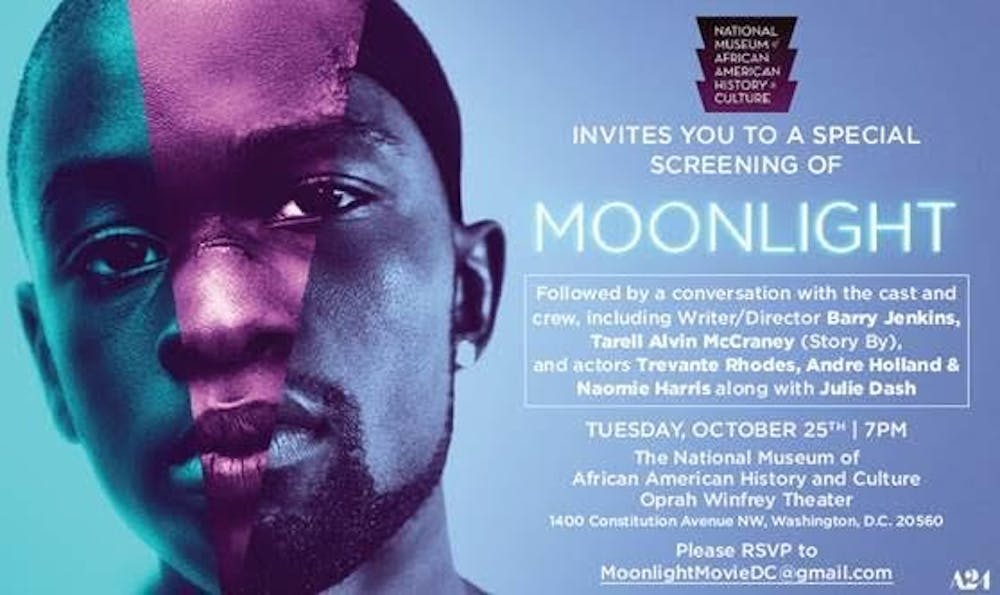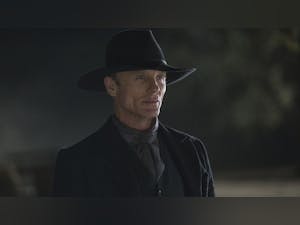From: The Scene Blog
Movie Review: Moonlight conveys what intimacy and vulnerability means in a culture that rejects feeling

We often forget how lonely it is to be a child. There is a sense of isolation, yearning and longing in youth; a type of wondering and wanting for things we cannot express because we do not know them yet. The vulnerability of youth, the pain of being taught to hate yourself and the walls we create to protect ourselves from the truth are all perfectly articulated in Barry Jenkins’ Moonlight.
Moonlight tells the story of Chiron, who is poor, Black and gay, as he grows up in the Miami Projects during the 1980s. He is played by three different actors over the course of the film: small and quiet as a boy (Alex Hibbert), gangly and awkward as a teen (Ashton Sanders) and immense and withdrawn as a man (Trevante Rhodes).
Near the beginning of the film, in the segment titled “Little,” Chiron runs away from school bullies and hides in a dilapidated house. He is found by Juan (Mahershala Ali), a drug pusher who feeds him and takes him back to the house he shares with his partner, Teresa (Janelle Monáe). From then on, Juan and Teresa become a safe haven for Chiron, a way to escape his home with his angry, sad and crack-addicted mother, Paula (Naomie Harris). The scenes between Juan, who affectionately calls Chiron “Little” and transforms the name Chiron is taunted with into a gesture of real love, stand out amidst the ugliness that Little faces. In a series of beautiful shots, Juan teaches Little how to swim. It is one of the most loving parts of the film, with Juan holding Little amid the waves, telling him, “I got you a promise. Never let you go.”
However, director Jenkins is no fool. This is not a film about sentimentality and simplicity. During a painful scene, Little asks Juan if his mother does drugs. He follows up asking if Juan is a drug dealer. Juan tells the truth. The use of silence and quiet in these pivotal moments is what makes them stand out. Actors Ali and Hibbert have excellent chemistry, their eyes and glances telling more than the words they say.
During the second part of the film, titled “Chiron,” the difference between the main character and his classmates has grown to the point where he is completely and utterly ostracized. He is not one of the other boys at school and is still sensitive and awkward in his skin. His only friend is Kevin (Jharel Jerome), who is smart and confident. Earlier in the film, as young boys, Kevin tries to teach Little that fighting back is the only way to survive. Maybe this is why Kevin fits in and Chiron does not, but still, Kevin offers Chiron a type of kindness and understanding that no one else provides. Juxtaposed with the increasing hostility Chiron faces from his mother, whose addiction has gotten far worse, Kevin is the someone that Chiron needs.
There is so much vulnerability in the scene where Chiron meets Kevin on the beach where Juan once taught him to swim. Cast in the moonlight, they share their first kiss, leading Chiron to apologize. Intimacy and trust are linked hand in hand to Chiron, and as much as Chiron wants to trust Kevin, he can't trust someone else when he can hardly trust himself.
Blissful moments are short lived for Chiron. Goaded by the school bullies who imply to Kevin that they know there is something more between him and Chiron, Kevin beats Chiron up and allows the bullies to attack him, too. It is the only act of visceral physical violence portrayed in the film and the shots are jerky and surprising. The camera lingers on Chiron’s face, especially as he looks back at Kevin as the bullies yell, “stay on the ground.”
My fellow audience members at the National Museum of African American History and Culture cheered as they watched Chiron fight back in the next scene, breaking a chair over one of his abusers. But the reality of fighting back isn’t victory. Rather, Chiron is taken away in handcuffs.
When we see him next, in the third and final segment “Black,” Chiron is a large, hulking, muscular man (Rhodes). He is a drug dealer, accruing wealth and success but repressing his sorrow and pain. It would be hard to recognize him as the shy boy or the lonely teen if not for his eyes. Chiron is now known as “Black,” the nickname Kevin once gave him. As Black drives down the roads of his childhood, there is a sense of isolation, emotions slipping through the cracks of the hardened exterior he worked so diligently to create.
Late at night, Black receives a phone call from Kevin, played by the outstanding André Holland, whom he has not spoken with for many years. When he goes to see him, what happens is so perfectly and heartbreakingly portrayed by Rhodes and Holland. Although Black plays “Classic Man” by Jidenna on his car stereo, loud enough for everyone to hear and know that he is a dominant figure, there is a scene where Barbara Lewis’ “Hello Stranger” plays on a jukebox and we see his exterior crumble.
Without hesitation, Moonlight is one of the most important films of the year, possibly the decade. I was lucky enough to have been able to attend its screening at the newly opened Smithsonian Institute’s National Museum of African American History and Culture. During the Q&A following the screening, playwright Tarell Alvin McCraney, author of “In the Moonlight Black Boys Look Blue” on which Moonlight is based, stated that “theatres are institutions of higher learning.”
McCraney is right. In Jenkins’ film, we are forced to confront issues like race, gender, sexuality, intimacy, class, the prison industrial complex, drugs and addiction. The power of “Moonlight” is its ability to portray these issues without ever coming off as preachy or one sided. Jenkins and his actors understand that being human is more than these things, but, at the same time, being trapped within them.
As I watched the credits roll, I sat in silence. To be in the museum, seeing a work so raw, unique and moving, I knew that I had the honor of being part of history.
Grade: A+
Naomi Zeigler is a senior in the College of Arts and Sciences and is the Opinion Editor for The Eagle.




